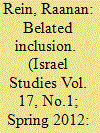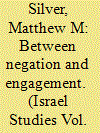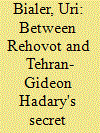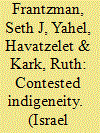| Srl | Item |
| 1 |
ID:
112524


|
|
|
|
|
| Publication |
2012.
|
| Summary/Abstract |
This article analyzes the changing attitudes of the Israeli authorities towards the Jewish veterans of the International Brigades, most of them Communists. Following a brief overview of Jewish participation in general and Jewish Palestinian participation in particular in the Spanish Civil War, we focus our attention first on the initial reactions to the returning volunteers and then on two major events in the process of memory appropriation and gradual inclusion of these fighters in the Israeli national narrative: the 1972 Tel-Aviv conference of Jewish fighters in Spain, sponsored by the Histadrut, and the 1986 speech by Israeli president Chaim Herzog on the 50th anniversary of the outbreak of the Spanish Civil War. Once the fighters' documents were deposited in the archives of the Israel military in the 1990s, the process was complete. Now they could be portrayed as Jewish heroes, national patriots fighting to protect their people and their homeland, Israel.
|
|
|
|
|
|
|
|
|
|
|
|
|
|
|
|
| 2 |
ID:
112528


|
|
|
|
|
| Publication |
2012.
|
| Summary/Abstract |
The image of America in Hebrew language novels serves as a compelling barometer of trends in Zionist culture and Israeli society. For decades after Israel's establishment, a caustically negative approach to American Jews and American life colored novels authored by Hebrew writers who helped fashion the image of a new Israeli personality, the pioneering sabra. This article argues that these "negation of the American Diaspora" novels constitute just one phase of Hebrew fiction's encounter with America. It analyzes the roots, implications and content of forms of positive engagement (albeit not full endorsement) of American Jewish milieus that are appreciable in Hebrew novels written before Israel's establishment, and in the last ten or fifteen years.
|
|
|
|
|
|
|
|
|
|
|
|
|
|
|
|
| 3 |
ID:
112523


|
|
|
|
|
| Publication |
2012.
|
| Summary/Abstract |
The young State of Israel had been greatly assisted by non-Israeli Jews. However, for obvious reasons this aspect of its foreign policy history has been shrouded with secrecy and most of these individuals have remained unrecognized. The article sheds light on the activities of one of them, Gideon Hadary, who was born in Chicago, raised in Rehovot, educated in the United States, became an OSS and later a State Department intelligence officer, and who at the same time secretly rendered invaluable diplomatic help to the Jewish Agency and the State of Israel. More research is badly needed to uncover the full range of this aspect of the country's "statecraft in the dark".
|
|
|
|
|
|
|
|
|
|
|
|
|
|
|
|
| 4 |
ID:
112526


|
|
|
|
|
| Publication |
2012.
|
| Summary/Abstract |
The article examines the history of the development of a discourse that regards the Bedouin of the Negev desert in Southern Israel as an indigenous people of Israel. This movement has generated a great deal of activity in recent years, particularly the submission of a petition to the U.N. by activists asking for the Bedouin to be recognized as having indigenous communal rights in 2005. The subject is examined in the context of the worldwide recognition of indigenous rights that culminated in the U.N. Declaration on the Rights of Indigenous Peoples, which was adopted on the 13th of September 2007. The article takes account of the processes and activities of individuals who have helped lead and craft a narrative of an indigenous Bedouin identity. It also explores the rise of an indigenous consciousness movement as reflected in states, academic institutions, NGOs, and individuals across the world, with a focus on some of the implications for Israel and the region of the current struggle for recognition for indigenous rights.
|
|
|
|
|
|
|
|
|
|
|
|
|
|
|
|
| 5 |
ID:
112529


|
|
|
|
|
| Publication |
2012.
|
| Summary/Abstract |
The article discusses Naomi Shemer's contribution to the linguistic transformation of the field of song in the state of Israel's early years. Placing Shemer's work within its immediate cultural context, the article distinguishes two periods in her work: the 1950s-early 1960s-in which she was at the forefront of the transition from classicized linguistic style to more contemporary-oriented language, and the 1960s on-in which her work took a conservative turn, and certain modes of expression she had initially eschewed were reintroduced into her lyrics. The innovative dimension that marked Shemer's early work is presented in the light of characteristics of pre-state period songs, changes undergone by the field of song with the transition to statehood, as well as the evolution of Shemer's own work throughout the years.
|
|
|
|
|
|
|
|
|
|
|
|
|
|
|
|
| 6 |
ID:
112527


|
|
|
|
|
| Publication |
2012.
|
| Summary/Abstract |
The article examines the modesty campaigns led by Neturei Karta circles in the period 1938-1974 under the leadership of Rabbi Amram Blau (1896-1974). This study was made possible following the discovery of Blau's personal archive. It explores the defensive stage of the modesty campaign that was aimed mostly to strengthen the Haredi enclave and to separate it from secular Jerusalem with the establishment of the modesty patrols. It discusses the offensive campaign with the examination of the struggle against mixed swimming pools and against a club operated by Working Mothers' organization. The second stage was intended mainly to reinforce Neturei Karta's leadership position among the Haredi public in Jerusalem. It explores the zealotry ethos in the context of the torching of the Eros sex shop in Jerusalem.
|
|
|
|
|
|
|
|
|
|
|
|
|
|
|
|
| 7 |
ID:
112525


|
|
|
|
|
| Publication |
2012.
|
| Summary/Abstract |
This article offers a study of the Permanent Mandates Commission's first discussion of Palestine-at its fifth session in 1924. The PMC was charged by the League of Nations with the task of monitoring the progress of the post-war mandates. The article argues that, in contrast to the way in which these meetings have been portrayed in previous scholarship (namely, as either virulently anti-Zionist or staunchly anti-Arab), the members of the commission generally engaged in a reasoned discussion of the challenges of enforcing the multiple and competing terms of the Palestine Mandate, mindful of the defined limits of the commission's mission. The article pays close attention to the social and dialogical dynamics of the discussions and contends that sensitivity to these dynamics allows for a more compelling, nuanced understanding of the debate. It further suggests the need for careful consideration of the meaning of the charge of "bias" as an explanatory tool in historical analysis.
|
|
|
|
|
|
|
|
|
|
|
|
|
|
|
|